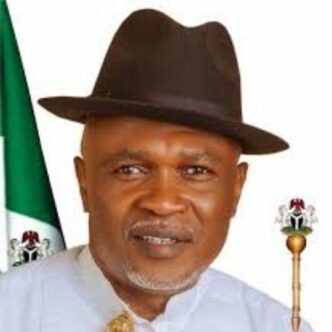HB: 1117 A BILL FOR AN ACT TO ALTER THE PROVISIONS OF THE CONSTITUTION OF THE FEDERAL REPUBLIC OF NIGERIA, CAP C23 LAWS OF THE FEDERATION OF NIGERIA 2004 TO REVIEW THE MEANS OF ELECTION INTO THE OFFICES OF THE CHAIRMEN 34AND VICE-CHAIRMEN OF THE LOCAL GOVERNMENT COUNCILS IN NIGERIA; AND FOR RELATED MATTERS Bill Sponsor: Hon. Chinda Kingsley Ogundu Bill Progress: Committee Stage
This Bill seeks to alter the provisions of section 7 of the Constitution, to review the means of election into the offices of the Chairmen and Vice-Chairmen of the Local Government Councils in Nigeria. The bill is introducing a new sub-section 7A to 7C that proposes for the Local Government leadership to be nominated and voted into office by the members of its legislative council.
In a significant development for local governance in Nigeria, the House of Representatives has introduced House Bill 1117, aimed at amending the Constitution of the Federal Republic of Nigeria. This proposed legislation seeks to alter the provisions regarding the election process for chairmen and vice-chairmen of local government councils across the country.
House Bill 1117, designated with the identifier “HB: 1117,” outlines a focused initiative to review and potentially revolutionize how local government leaders are elected. Unlike broader reforms that might address various aspects of local governance, this bill specifically targets the electoral methods for these key positions within local councils.
One of the primary objectives of House Bill 1117 is to redefine the means of election for local government chairmen and their deputies. This move has gained attention, as the method by which local leaders are selected has been a contentious issue in Nigeria. Currently, many local government officials are elected under systems influenced significantly by state governments, which has raised concerns over autonomy and genuine representation.
The bill’s proposed changes could include introducing direct elections for local government chairmen and vice-chairmen, thereby reducing state interference in local governance. Such a shift could empower communities by allowing citizens to have a more significant say in who represents them at the local level, which is essential for enhancing local governance and accountability.
Moreover, the significance of House Bill 1117 goes beyond procedural adjustments; it reflects ongoing discussions surrounding local government autonomy in Nigeria. The ability for local councils to operate independently and effectively is crucial for addressing community needs and improving service delivery. By revising how local government leaders are elected, the bill aims to strengthen democratic principles at the grassroots level.
The inclusion of the standard legal phrase “and for related matters” indicates that the bill may encompass additional provisions necessary to implement its core objectives. However, the specific contents detailing the exact nature of the proposed changes—such as whether new electoral systems will be introduced or existing structures will be reformed—remain to be examined in the full text of the bill.
If passed, House Bill 1117 would mark a pivotal moment in Nigerian governance, as it seeks to enhance the democratic process within local councils. The implications of this bill could resonate widely, influencing the relationship between local governments and state authorities and promoting a more accountable and transparent governance system.
As discussions around this bill continue, members of the House of Representatives, stakeholders in local governance, and citizens alike will be closely watching its progress. The outcome of House Bill 1117 could play a crucial role in shaping the future of local government in Nigeria, resonating with calls for greater autonomy, improved electoral processes, and a more robust democratic framework at the local level.













